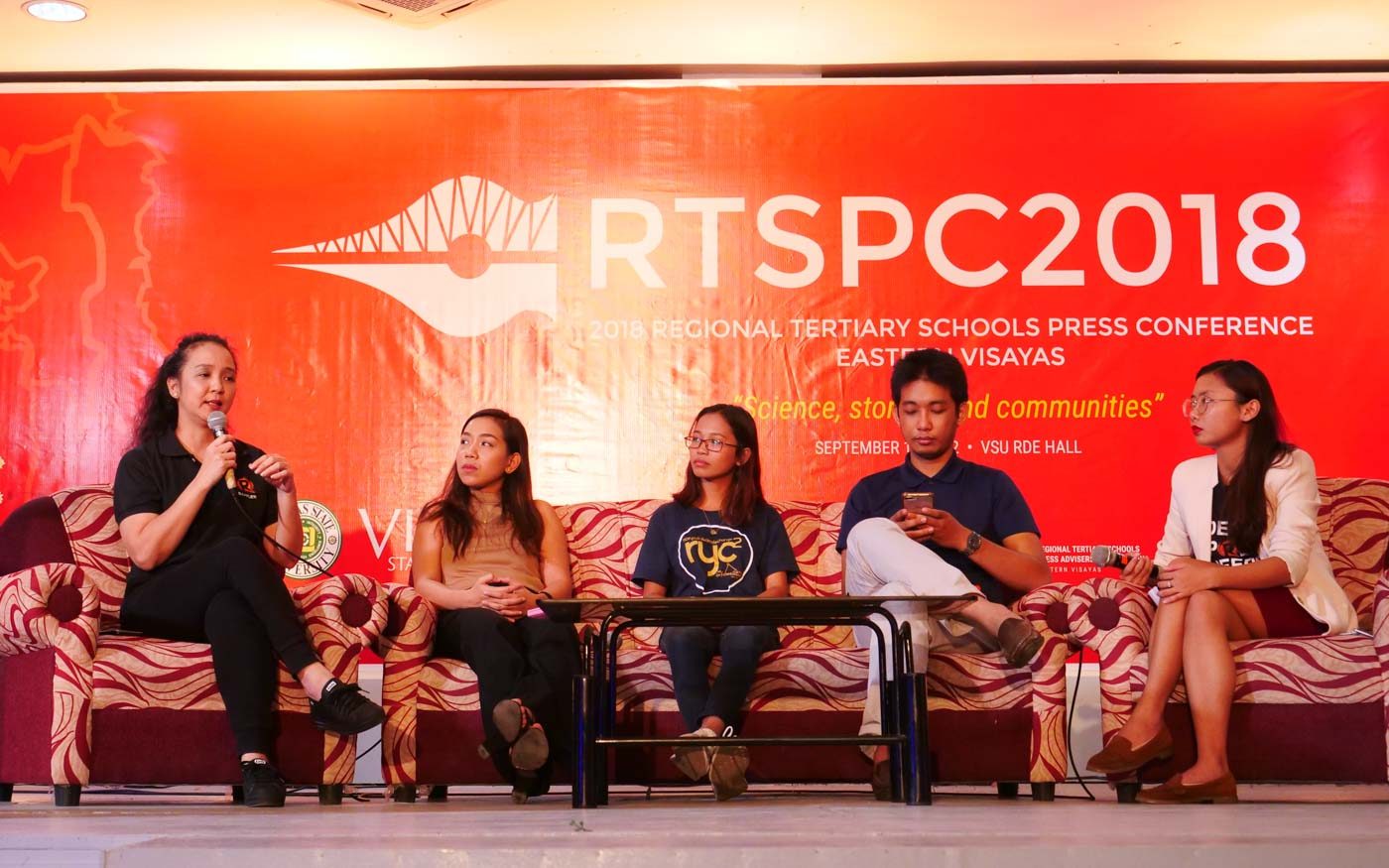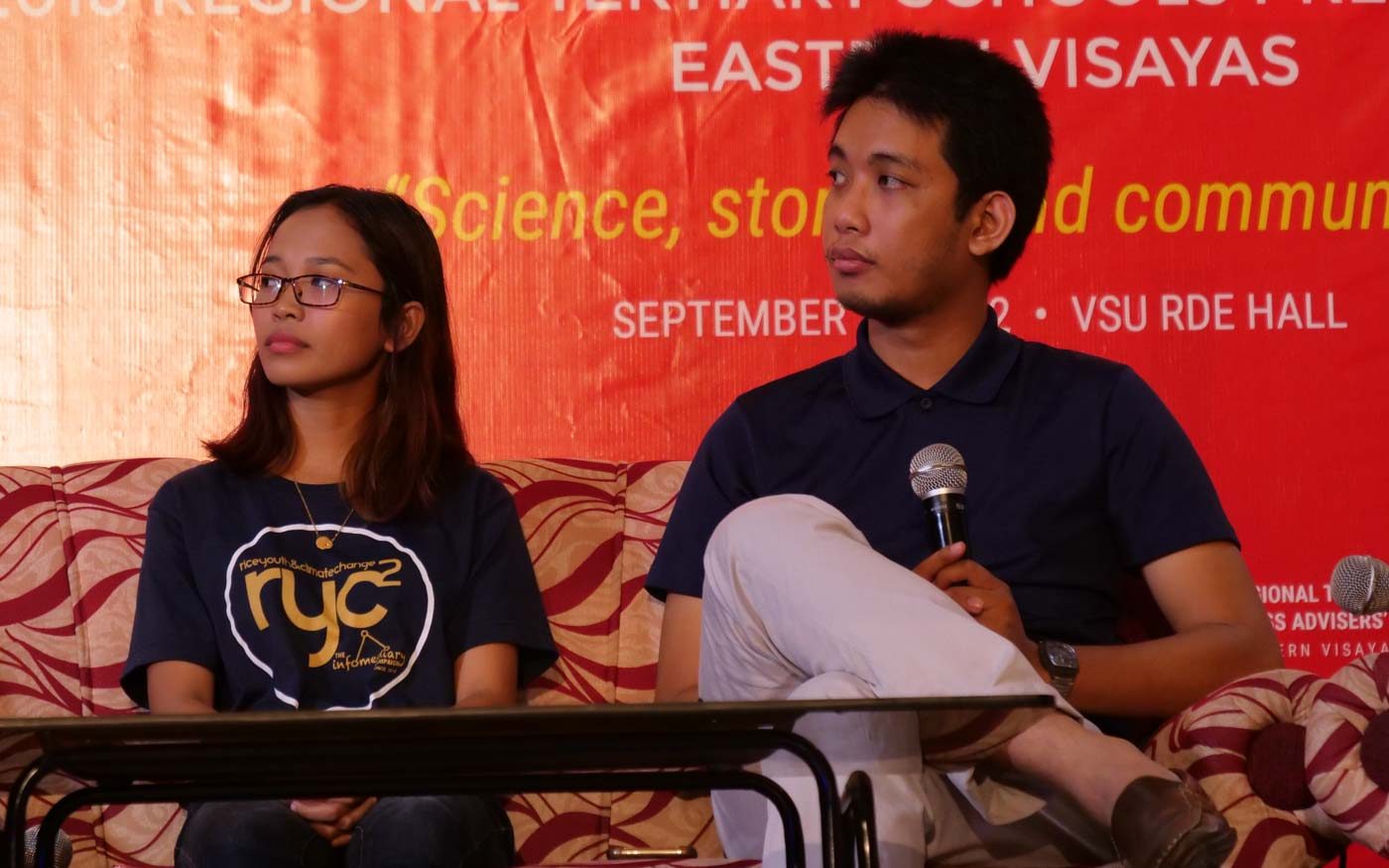SUMMARY
This is AI generated summarization, which may have errors. For context, always refer to the full article.

LEYTE, Philippines – The fight against disinformation online has to be a crusade of not just a few individuals or organizations, but a whole community.
This was the message of journalists to the participants of the “#MoveLeyte: Social Good in the Digital Age” forum held at the RDE Hall of the Visayas State University (VSU) in Baybay, Leyte last Wednesday, September 19.
“If fact-checking and truth-telling [are] to win against the propaganda machine, they need the effort of the communities, the campus journalists, and the citizen journalists from the ground,” said Rappler news editor Miriam Grace Go.
According to Go, social media has exponentially increased the sophistication and reach of disinformation. (READ: Propaganda war: Weaponizing the internet)
Disinformation and hate are amplified by troll farms whose workers aggressively comment on news stories that are not favorable toward issues and political personalities they support.
Meanwhile, Hanna Joyce Macawili, managing editor of VSU’s official school publication, The Amaranth, shared that campus journalists are also on the receiving end of hatred online.
“Online hate has been a daily part of the Amaranth staff because of our coverages and our stakeholders do not want the issues we cover,” said Macawili.
The same sentiment was shared by their school paper adviser Jed Asaph Cortes. “Major bashing came when the Amaranth put up a statement on Marcos’ burial and when our publication posted a statement regarding Rappler and SEC issue,” said Cortes.
Biggest hurdle: media literacy
Rappler’s Community head Stacy de Jesus said that the biggest hurdle that media face is still media literacy. According to De Jesus, people don’t understand the role of the media so they don’t trust them.
“The role of the media is to speak truth to power and to write facts. We are the messengers. Hindi naman namin trabaho na mag overthrow ng government or to be their cheerleader,” added De Jesus. (Our job isn’t to overthrow the government or to be their cheerleader.)
Amid the backlash that Rappler is receiving, being tagged by pro-administration quarters as “bayaran” or a paid journalists or biased, Go said the organization does not take sides nor report to please any camp.
“We report what’s happening. We call out kung sino ang nagsisinungaling,” said Go. (We call out those who lie.)

Cortes, who also teaches communication courses at the VSU, said that the current curriculum now is far from perfect.
“Sometimes the students themselves do not know the role of the media. Last year, I was able to handle senior high school students. MIL [media information literacy] should be part of the curriculum. I feel like I have this responsibility to inculcate to them the role of the media because they feel like the media is antagonizing,” shared Cortes.
How do we fight disinformation?
As in reporting issues, where Rappler’s Go advised the campus journalists to “go local,” she also said countering disinformation should start at the community level.
This is because they will first establish their credibility as fact-checkers and truth-tellers in the community where people know them in a personal way.
“Who will listen [to you]? ‘Yung mga kaklase mo muna. ‘Yung mga friends mo sa Facebook (Your classmates first, your friends on Facebook). When you start talking about local issues and not national issues, people will listen to you.” (READ: WATCH: 6 ways to spot a fake news article)
Go told campus journalists: “You are not just any social media users, you are campus journalists. You are in that very critical position where you are expected [as netizen] to also observe the standards of professional journalists.”
Cortes, meanwhile, advised the participants to not share anything that is not validated yet. “Look at the sources that you trust. Evaluate properly and then discuss the issues.”
For De Jesus, people should be engaged. According to her, people should ask questions when they are are not sure of something. This way, spread of wrong information will be prevented.
At least 250 campus journalists, student organization leaders, school paper advisers, and other stakeholders joined the forum which aimed to help them understand the nature of digital platforms and sparked a conversation around opportunities and threats to journalism and democracy in these trying times.
How about you? How can you take part in preventing the spread of disinformation online? – Rappler.com
Add a comment
How does this make you feel?
There are no comments yet. Add your comment to start the conversation.